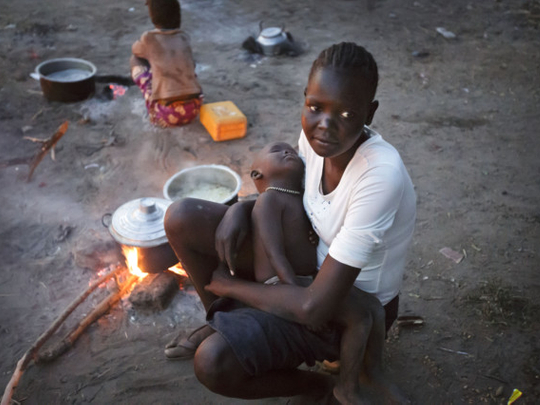
Addis Ababa: South Sudan’s warring parties were due to start peace talks on Thursday in the Ethiopian capital in a bid to end nearly three weeks of conflict that has left thousands dead in the world’s newest nation.
Government and rebel negotiating teams arrived in Addis Ababa on Wednesday evening and while talks were expected on Thursday, formal negotiations may not open for several days, Ethiopia’s foreign minister said.
UN special envoy Hilde Johnson said in Juba it was “positive that they are sending delegations,” underscoring the dire need for “reconciliation and healing” after the violence that has forced 200,000 people to flee their homes.
“We have seen terrible acts of violence in the past two weeks...and as we know, if there is no one held accountable, there is a major risk that the violence can continue,” she added.
President Salva Kiir on Wednesday declared a state of emergency in Unity and Jonglei, two states where rebels loyal to former Vice-President Riek Machar control the capitals.
Fighting erupted in South Sudan on December 15, when President Salva Kiir accused his former deputy Riek Machar of attempting a coup.
Machar has denied this, in turn accusing the president of conducting a violent purge of his opponents, and the fighting has spread across the country, with the rebels seizing several areas in the oil-rich north.
On Tuesday they recaptured Bor, the capital of Jonglei state just 200 kilometres north of the capital Juba.
The government confirmed on Wednesday that it had lost control of Bor, which has changed hands three times in the past two weeks, as fighting reportedly continued in the area.
Thousands of people are feared dead, UN officials say, while close to 200,000 civilians have been forced to flee their homes — many seeking refuge with badly overstretched UN peacekeepers.
The conflict has also been marked by an upsurge of ethnic violence pitting members of Kiir’s Dinka tribe against Machar’s Nuer community, and the UN Mission in South Sudan (Unmiss) said that “atrocities are continuing to occur” across the country.
Unmiss reported “extra-judicial killings of civilians and captured soldiers” and the “discovery of large numbers of bodies” in Juba, Bor and Malakal, the main town in oil-producing Upper Nile state.
The International Committee of the Red Cross said residents continue to pour by the thousand out of Jonglei and across the White Nile into Awerial county in neighbouring Lakes state.
“The road to the river is lined with thousands of people, with others waiting for boats to carry them across,” said Francois Moreillon, ICRC deputy head of delegation.
The UN last week estimated that some 70,000 people had already fled into Awerial.
The UN mission also said it was “actively collecting information” on the atrocities to be used for future official investigations.
On Tuesday, Machar told AFP via satellite phone that he was not yet ready to agree to an immediate ceasefire nor hold face-to-face talks with Kiir, and that his forces were marching on the capital Juba.
“There is no cessation of hostilities yet,” Machar said. “That is what the delegation going to Addis Ababa is going to discuss and to negotiate. I will follow later, once the negotiations have resulted in a cessation of hostilities. It depends on if and when that is achieved.”
Kiir has described the war as “senseless”, but has ruled out power sharing with the rebels. The president has also rejected rebel demands that a number of their loyalists, arrested shortly after the violence started, be released.
“What power sharing? It is not an option. This man has rebelled. If you want power, you don’t rebel so that you are awarded with the power,” Kiir said in an interview broadcast on the BBC.
South Sudan won independence from Sudan in 2011 after decades of civil war.











